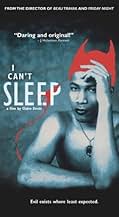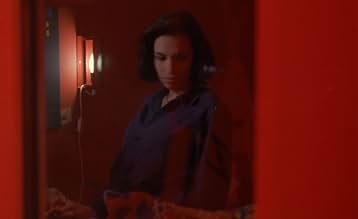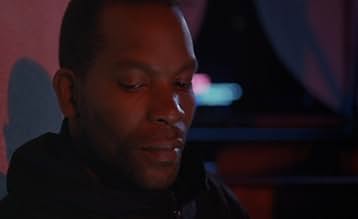CALIFICACIÓN DE IMDb
6.8/10
1.4 k
TU CALIFICACIÓN
Un asesino en serie aterroriza París por la noche, pero eso no impide que Daïga y Théo se reúnan y se enamoren.Un asesino en serie aterroriza París por la noche, pero eso no impide que Daïga y Théo se reúnan y se enamoren.Un asesino en serie aterroriza París por la noche, pero eso no impide que Daïga y Théo se reúnan y se enamoren.
- Dirección
- Guionistas
- Elenco
- Premios
- 3 nominaciones en total
Yekaterina Golubeva
- Daiga
- (as Katerina Golubeva)
Danièle Van Bercheycke
- Fleur
- (as Danielle van Bercheycke)
- Dirección
- Guionistas
- Todo el elenco y el equipo
- Producción, taquilla y más en IMDbPro
Opiniones destacadas
I enjoyed this film that had beautiful images of the male body, and a colorful mix of characters. Although the director, Claire Denis is a straight, white, woman, the film is full of homosexuality images. These images are done artfully however, do not limit the films appeal to a wide range of people. Although a serial killer is loose in Paris, this film is not a classic thriller, in the sense that the viewer does not feel on-edge, and actually might feel comfortable with the killer as did I. I would recommend this film as a good peek at what it is like to be an outsider in Paris.
This is a very strange film, indeed. In the plot there's something about a Latvian immigrant in Paris, a couple of homosexuals, an old lady's murderer, some African immigrants (I think they're from the Maurice Islands), a woman who is a hotel manager and protects the young Latvian, a transvestite who has his own show on a nightclub, and some other crimes and weird stuff.
But it's not a bad movie after all. Despite the confusing plot, the film has some very nice sequences, some shocking scenes and one of the most beautiful actresses I've ever seen, Ms. Katherina Golubeva, whom I'd never heard about before this film. If you have a lot of time to spend, and you're in the mood for an unusual motion picture with a gorgeous young actress, "J'Ai pas Sommeil" is a good pick.
But it's not a bad movie after all. Despite the confusing plot, the film has some very nice sequences, some shocking scenes and one of the most beautiful actresses I've ever seen, Ms. Katherina Golubeva, whom I'd never heard about before this film. If you have a lot of time to spend, and you're in the mood for an unusual motion picture with a gorgeous young actress, "J'Ai pas Sommeil" is a good pick.
10lwong
"I Can't Sleep" opens with a shot of policemen laughing in a helicopter above Paris, a scene Denis says has no narrative function. The helicopter doesn't blow up or crash (as we half-expect, so Hollywood-trained we have become). We never learn why they are laughing, and it never comes up. but it immediately sets a tone of ordinariness about something that is so freighted with allusion - that police work is all dark violence and angst and frayed tension. Police work also includes ordinary moments between two people.
"I Can't Sleep" follows three sets of characters who come to be loosely linked. First is Daïga (Katerina Golubeva, an unknown with an exotic resemblance to Michelle Pfeiffer) who drives away from Lithuania and into the Paris ring in her boxy, smoking car. She has only vague ideas about what she wants other than to let Paris wash over her life. for the time being, she finds a tenuous niche in the émigré community working indifferently as a maid in a second rate hotel. Among the hotel's residents is Camille (another unknown, Richard Courcet as a drag hoodlum with a brooding boredom) who, with his friends and lovers, leads us through the gay subculture. And there is Theo, Camille's good brother who struggles the struggle of the unFrench emigrant class in neoconservative France. As we stay with these characters, we see a Paris that isn't a backdrop to romantic comedies like "Forget Paris" or "French Kiss." In the course of "I Can't Sleep" we get a sense of the shape of some of the other kinds of lives that are lived in Paris. We begin to move to the film's rhythm. At intervals are arresting set pieces that attenuate reaction. These subtle departures don't break the film's basic form, but they do break the mood of the expected. We get to laugh and be aware that we are laughing. We marvel at small things and know we are marvelling at them.
In "I Can't Sleep," newspaper headlines scream about a sociopath who is going around murdering and robbing solitary old women (based on a true case). Denis illustrates for us what we know to be true - that mostly people are unaffected. Everyone's lives continue to be lived routinely, each with their own personal life traumas that fill their days. By chance, the murders intersect our characters' lives and we see their reactions to it. There aren't any obvious cues for us. We watch Daïga as she learns who the murderer is. What she does and what happens as a result is less important than the almost wordless scene they share when she follows him. Something essential passes between them, but what that is is up to you. It's as much based on the experience you can bring to it and what abstractions you can add to the moment. Likewise, Theo's face is a dispassionate mask - it begs us on to project our reactions to his life circumstances.
This is a tenuous connection, a lot for Denis to ask of her audience, and it may not engage many or even most of those sitting out there. In a way, you have to have a ready state of mind to watch it. It reminds me most of Kryzysztof Kieslowski's "Red" and the conversations I had about it. More than a few friends said they couldn't suspend their qualms about the believability of the relationship between Jean-Louis Trintignant's character and Irene Jacob's. It was too far from convention (age difference) and lacked a believable basis (he was just a weird old guy, and what did they share anyway?). But for me, I loved it because his character seemed the tragic sum of all the characters I have seen Trintignant play (especially in "A Man and A Woman," "Z," "The Conformist" among others). Here was the same good man, now ruined at an advanced age, and I was meeting him again. I felt I understood him fundamentally, knew what he had gone through to reach this sour moment in his life and because of this, it was easy for me to project my understanding onto Jacob's character. I thought, "Of course she loves him."
Anyway, "I Can't Sleep" is, at its best moments, a collage of sometime odd elements that is somehow perfectly composed (like in "Paris, Texas" and "Wings of Desire," and in Kieslowski, especially, "Red" and some of the Dekalog episodes like "Thou shalt not bear false witness"). One can't explain why it seems right, but everyting certainly does feel just right - the film is conjured from single notes that together comprise a whole score. There is what seems like extraneous stuff in there. You wonder how it fits, what it really means. Yet, it nevertheless feels right once the whole has been digested.
"I Can't Sleep" follows three sets of characters who come to be loosely linked. First is Daïga (Katerina Golubeva, an unknown with an exotic resemblance to Michelle Pfeiffer) who drives away from Lithuania and into the Paris ring in her boxy, smoking car. She has only vague ideas about what she wants other than to let Paris wash over her life. for the time being, she finds a tenuous niche in the émigré community working indifferently as a maid in a second rate hotel. Among the hotel's residents is Camille (another unknown, Richard Courcet as a drag hoodlum with a brooding boredom) who, with his friends and lovers, leads us through the gay subculture. And there is Theo, Camille's good brother who struggles the struggle of the unFrench emigrant class in neoconservative France. As we stay with these characters, we see a Paris that isn't a backdrop to romantic comedies like "Forget Paris" or "French Kiss." In the course of "I Can't Sleep" we get a sense of the shape of some of the other kinds of lives that are lived in Paris. We begin to move to the film's rhythm. At intervals are arresting set pieces that attenuate reaction. These subtle departures don't break the film's basic form, but they do break the mood of the expected. We get to laugh and be aware that we are laughing. We marvel at small things and know we are marvelling at them.
In "I Can't Sleep," newspaper headlines scream about a sociopath who is going around murdering and robbing solitary old women (based on a true case). Denis illustrates for us what we know to be true - that mostly people are unaffected. Everyone's lives continue to be lived routinely, each with their own personal life traumas that fill their days. By chance, the murders intersect our characters' lives and we see their reactions to it. There aren't any obvious cues for us. We watch Daïga as she learns who the murderer is. What she does and what happens as a result is less important than the almost wordless scene they share when she follows him. Something essential passes between them, but what that is is up to you. It's as much based on the experience you can bring to it and what abstractions you can add to the moment. Likewise, Theo's face is a dispassionate mask - it begs us on to project our reactions to his life circumstances.
This is a tenuous connection, a lot for Denis to ask of her audience, and it may not engage many or even most of those sitting out there. In a way, you have to have a ready state of mind to watch it. It reminds me most of Kryzysztof Kieslowski's "Red" and the conversations I had about it. More than a few friends said they couldn't suspend their qualms about the believability of the relationship between Jean-Louis Trintignant's character and Irene Jacob's. It was too far from convention (age difference) and lacked a believable basis (he was just a weird old guy, and what did they share anyway?). But for me, I loved it because his character seemed the tragic sum of all the characters I have seen Trintignant play (especially in "A Man and A Woman," "Z," "The Conformist" among others). Here was the same good man, now ruined at an advanced age, and I was meeting him again. I felt I understood him fundamentally, knew what he had gone through to reach this sour moment in his life and because of this, it was easy for me to project my understanding onto Jacob's character. I thought, "Of course she loves him."
Anyway, "I Can't Sleep" is, at its best moments, a collage of sometime odd elements that is somehow perfectly composed (like in "Paris, Texas" and "Wings of Desire," and in Kieslowski, especially, "Red" and some of the Dekalog episodes like "Thou shalt not bear false witness"). One can't explain why it seems right, but everyting certainly does feel just right - the film is conjured from single notes that together comprise a whole score. There is what seems like extraneous stuff in there. You wonder how it fits, what it really means. Yet, it nevertheless feels right once the whole has been digested.
A movie genre that I've occasionally seen focuses on the gritty underbelly of supposedly idealistic places. Claire Denis's "J'ai pas sommeil" ("I Can't Sleep" in English) is one such movie. The protagonists are a group of in a dismal section of Paris who find each other amid a murder spree. This group includes a man from Martinique (a reminder of France's colonial history) and a woman from Lithuania (one of the many people who saw no prospects in their countries once the Eastern Bloc collapsed).
Quite a different image of France than we're used to, but this group of people still has it better than most people in the global south. The point is that millions if not billions of people worldwide live in these conditions. The people depicted in this movie could just as easily be people from Latin America seeking a better life in the US.
Basically, if you're reading this, then you're one of the privileged few. Definitely check out the movie.
Quite a different image of France than we're used to, but this group of people still has it better than most people in the global south. The point is that millions if not billions of people worldwide live in these conditions. The people depicted in this movie could just as easily be people from Latin America seeking a better life in the US.
Basically, if you're reading this, then you're one of the privileged few. Definitely check out the movie.
10bruxe
This film is a fictional portrayal based on the true story of Thierry Paulin, who with the help of his lover murdered twenty or so elderly women in the Montmartre area of Paris, during the eighties. He was known as the "granny killer." What I think confused the viewer who commented before me was the following: The United States has created a crime genre in which the detectives are heroes and the murderers are detestable yet mysterious. In a way, the pleasure in these films comes from watching the murderer act out our unconscious aggressions without our having to admit any identification with him. Claire Denis tried for a truer, more sociological portrait of the situation. She attempted to show the murderer's daily life and interactions with his community in a fashion that proved that, in some ways, he was no different than any other human being. There are no heroes or villains in this film, just a group of immigrants interwoven by the forces of urban life, and one of them happens to be a murderer. The film is a demystification of the "noir" genre. Since people are so used to seeing crime portrayed according to the usual formula, this film can be confusing at first glance. But the achievement of this film is monumental because it manages to draw us into the intimate life of a murderer without hyperbole and without demonizing him. It abandons the sensationalism created by the media to bring us face to face with a real situation.
¿Sabías que…?
- TriviaTodas las entradas contienen spoilers
- ConexionesReferences Le costaud des Épinettes (1923)
Selecciones populares
Inicia sesión para calificar y agrega a la lista de videos para obtener recomendaciones personalizadas
- How long is I Can't Sleep?Con tecnología de Alexa
Detalles
Taquilla
- Total en EE. UU. y Canadá
- USD 111,015
Contribuir a esta página
Sugiere una edición o agrega el contenido que falta

Principales brechas de datos
By what name was J'ai pas sommeil (1994) officially released in India in English?
Responda
























